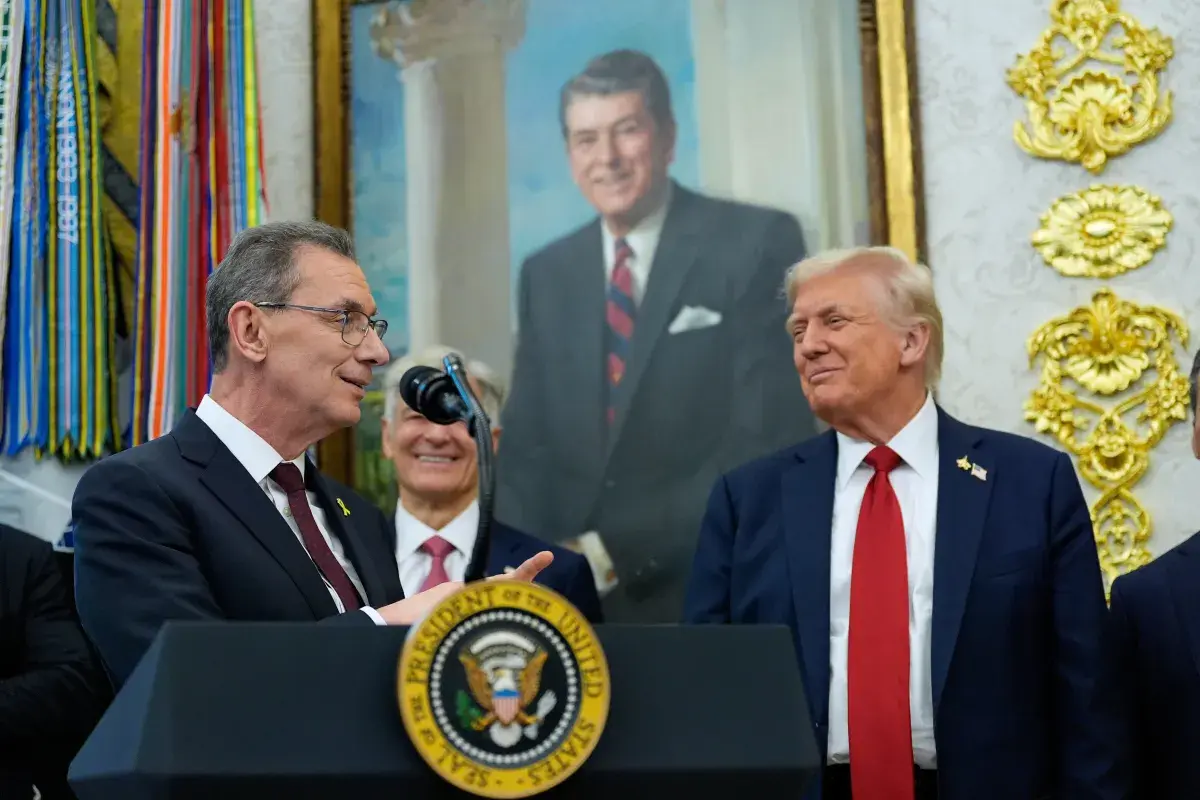
President Donald Trump announced a deal with the major pharmaceutical company, Pfizer, on Tuesday to bring down the costs of its products in line with the lowest price paid by other developed nations.
However, experts that spoke to Newsweek warned that the deal could be more beneficial for Pfizer than it is for Americans.
Rena Conti, a professor in the Department of Markets Public Policy and Law at the Questrom School of Business, Boston University, told Newsweek: “Pfizer is the winner in this deal.”
When approached for comment, Pfizer directed Newsweek to its CEO Albert Bourla’s remarks during the announcement that “the big winner of this deal, clearly, will be the American people.”
Pfizer also told Newsweek the announcement “removed uncertainty and creates pricing stability and predictability, which allows Pfizer to focus on what we do best: delivering breakthrough medicines to patients.”
Meanwhile, a White House official told Newsweek that the “reality is that Pfizer has agreed to lower drug prices for millions of everyday Americans and spend billions onshoring manufacturing to the U.S., paving the way for other pharmaceutical giants to come to the negotiating table with similar offers.”
Why It Matters
Drug prices are exceptionally high in the U.S., and research has shown that America pays more than three times as much as for brand-name pharmaceutical products as other wealthy countries.
The deal comes after Trump sent letters to 17 different pharmaceutical companies in July to bring down their drug prices, as part of a bigger objective to bring down pharmaceutical costs in the country.
The administration celebrated the arrangement as a way of bringing “tangible cost savings to American patients and the healthcare system as a whole,” and in the wake of the deal, Pfizer shares rose more than 4 percent.
The White House spokesperson told Newsweek that Pfizer’s stock “rallying” after the deal “reflects market confidence in Pfizer and the Administration’s ability to get other wealthy nations to pay their fair share for drugs.”
However, some experts are not quite as optimistic about the agreement.
How Will This Affect Americans?
The agreement will provide every state Medicaid program in the country access to Pfizer products priced in line with most-favored-nation (MFN) costs, meaning the lowest cost paid by other developed nations.
Pharmaceutical companies are already expected to provide Medicaid services with substantial discounts on drugs, but Pfizer has said that select brands will see reductions as high as 85 percent and its drugs on average will go down by 50 percent, according to a press statement.
People who pay cash for medicines will gain the most of this deal, David Ridley, a professor of business, economics, and public policy told Newsweek, adding this was “because they’ve been paying list prices.”
However, Medicaid recipients typically face small or no cost-sharing already, Peter Neumann, director of the Center for the Evaluation of Value and Risk in Health at Tufts Medical Center, told Newsweek.
He added that some Americans, such as those who are uninsured, may benefit from the lower prices of drugs bought directly from manufacturers, though he said “this segment will likely be small – and out of pocket costs may still be pretty steep for some drugs.” He said that questions still remain about “how much it will affect out of pocket costs.”
Conti said that “the cost differences announced will not be noticed by most Americans at the pharmacy counter.”
She said the drugs that were impacted “treat small patient populations and most patients using these products are well insured now,” meaning price reductions may not directly impact out of pocket costs for patients taking these drugs.
Pfizer is also required under the agreement to produce new drugs that are the same price in the U.S. as in other high-income countries, and according to a recent press statement, said that it would be participating in Trump’s website TrumpRx.gov, to give American patients access to its medicines at “a significant discount.”
The website, which is set to launch in 2026, is a government initiative to enable patients to buy drugs directly from manufacturers, at a discounted rate.
However, Conti said that, while some of Pfizer’s drugs may have 80 percent price decreases, the drugs would still “be unaffordable for many paying cash.”
She said that, for example, Xeljanz, a drug used to treat inflammatory and autoimmune conditions, has a list price of $6,000 to $7,000, so with an 80 percent price discount, it would still be between $1,200 to 1,400.
Neumann said there was also a negative effect that the “ongoing uncertainty that these sorts of one-off policy announcements, along with other regular but often vague Executive Orders and other announcements” may create.
“One imagines it is hard for companies and investors to plan in this environment,” he added.
What Does This Do For Pfizer?
In return, Pfizer will receive a three-year grace period from the 100 percent tariffs Trump has said he will impose on imports of branded pharmaceutical products from October 1, as long as Pfizer continues to invest in manufacturing in America.
Conti said this was important for Pfizer because “some of their top revenue generating products, such as the covid vaccine, are made overseas.”
She added that Pfizer also gets access to the new FDA Commissioner’s Voucher, a promise from the Food and Drug Administration to speed up review and approval for their new drugs in the pipeline, which could result in “more expected revenue and potentially a jump on competition.”
Mark Pauly, a professor of health care management at Wharton School of the University of Pennsylvania told Newsweek that the deal could also mean that Pfizer would “slack off its new drug development which will eventually reduce the supply of new effective drugs.”
What People Are Saying
Pfizer told Newsweek: “Pfizer recently announced we have reached a definitive agreement to acquire Metsera, which will build on Pfizer’s legacy of scientific leadership and help us deliver potential breakthroughs to patients in the high-growth therapeutic area of obesity and cardiometabolic disease. We have an opportunity to reshape the treatment landscape with a new generation of potential medicines that could be more effective, better tolerated and more convenient for patients to take. Additionally, oncology is one of Pfizer’s most promising therapeutic areas. We have a goal of delivering 8 cancer breakthroughs by 2030.”
Rena Conti, a professor at the Questrom School of Business, Boston University told Newsweek: “I don’t think this announcement or any of the other announced deals will meaningfully drop the prices of drugs Americans need to stay healthy, working and taking care of themselves and their families or bend the cost curve for payors. Only systematic change, like generic competition and Medicare negotiation, has been demonstrated to dramatically lower payor prices while still incenting innovation.”
Full Interviews Below
Newsweek’s interview with Rena Conti, a professor in the Department of Markets Public Policy and Law at the Questrom School of Business, Boston University.
Q1: What positive impacts do you think this move will have?
“Pfizer is the winner in this deal. Pfizer gets relief on tariffs for all their products for three years, which was meaningful to them because some of their top revenue generating products, such as the covid vaccine, are made overseas. In addition, Pfizer gets access to the new FDA Commissioner’s Voucher, a promise from the Food and Drug Administration to speed up review and approval for their new drugs in the pipeline. This can result in more expected revenue and potentially a jump on competition.”
Q2: How significant will these cost differences be to Americans? Will they notice major out of pocket differences?
“The cost differences announced will not be noticed by most Americans at the pharmacy counter. Most drugs Americans take are generic, and our research shows that Americans pay the lowest prices for generics compared to European country residents. The few drugs that are impacted by the announced charges treat small patient populations and most patients using these products are well insured now. Consequently, price reductions may not impact out of pocket costs for patients taking these drugs. The drugs with significant price concessions may reduce insurer spending, but it will not be large, because so few drugs are affected by these changes and they are not top spending drugs.”
“When TrumpRx launches, I understand that will be in Winter 2026, the handful of drugs that will be offered by Pfizer may have 80 percent price decreases compared to their brand price, but these drugs are still price high and will be unaffordable for many paying cash. For example, Xeljanz has a list price of $6,000 to $7,000. An 80 percent price discount off this price would amount to $1,200 to 1,400 out of pocket per prescription to treat a chronic disease. Patients will be better off using their insurance to pay or waiting for the generic to launch, also expected January 2026, when prices are expected to drop by 95 percent off the brand.”
Q3: Are there any negatives? If so, what are they and how significant do you think they will be?
“I don’t think this announcement or any of the other announced deals will meaningfully drop the prices of drugs Americans need to stay healthy, working and taking care of themselves and their families or bend the cost curve for payors. Only systematic change, like generic competition and Medicare negotiation, has been demonstrated to dramatically lower payor prices while still incenting innovation.”



